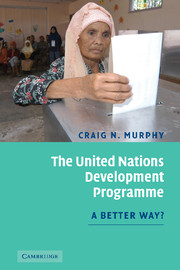Book contents
- Frontmatter
- Contents
- List of figures
- List of tables
- Foreword by Kemal Dervis
- Acknowledgements
- 1 Not the standard image
- 2 Development and the United Nations
- 3 Institutions for practical solidarity
- 4 Decolonization and economic transformation
- 5 Lewis in Ghana and after
- 6 Capacity, consensus, crisis, and consequences
- 7 Engaging liberation movements and revolutionary states
- 8 A learning organization: women, Latin America, and Africa
- 9 ‘Bottoms up’ development helps make UNDP a mammal
- 10 Working for ‘a holy man’ after the cold war
- 11 ‘Fabian socialists do not make the cut’
- 12 ‘Ploughing the sea’? UNDP and the future of global governance
- Index
12 - ‘Ploughing the sea’? UNDP and the future of global governance
Published online by Cambridge University Press: 08 January 2010
- Frontmatter
- Contents
- List of figures
- List of tables
- Foreword by Kemal Dervis
- Acknowledgements
- 1 Not the standard image
- 2 Development and the United Nations
- 3 Institutions for practical solidarity
- 4 Decolonization and economic transformation
- 5 Lewis in Ghana and after
- 6 Capacity, consensus, crisis, and consequences
- 7 Engaging liberation movements and revolutionary states
- 8 A learning organization: women, Latin America, and Africa
- 9 ‘Bottoms up’ development helps make UNDP a mammal
- 10 Working for ‘a holy man’ after the cold war
- 11 ‘Fabian socialists do not make the cut’
- 12 ‘Ploughing the sea’? UNDP and the future of global governance
- Index
Summary
Many of Kemal Dervis's early speeches as Administrator argued that UNDP's coordinating role and its early recognition of the imperative of UN reform would put it at the centre of an imminent process that was inseparably linked to a larger task of building effective, increasingly democratic global governance. Dervis told a January 2006 meeting of Res Reps,
Please don't treat this as, ‘Yeah, we've heard it before, they keep talking about UN reform, but it's business as usual.’ I don't think it will be business as usual over the next two to three years. You, the Resident Coordinators, will be in the middle of all this … hopefully with the help of all the agencies and agency management behind you.
The next day Dame Margaret Anstee, co-author of the Capacity Study (see chapter 6) and champion of a more rational United Nations for more than fifty years, wrote to say, ‘Anyone who believes that logical, overall reform is feasible is ploughing the sea!’ She later added, ‘But I DO think that reform is essential and urgent but that the only way of making headway is by some individual and important changes that would have a multiplier effect.’
The recurrent impediments to comprehensive UN reform are the deep conflicts that fracture the state system and, therefore, are played out within intergovernmental organizations.
- Type
- Chapter
- Information
- The United Nations Development ProgrammeA Better Way?, pp. 331 - 356Publisher: Cambridge University PressPrint publication year: 2006



